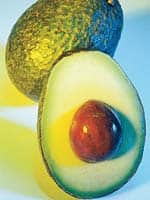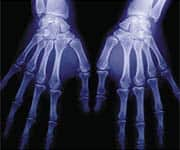Life Extension Magazine®
Standard medical advice for people with osteoporosis is to take a calcium supplement with vitamin D, and often a bisphosphonate drug such as Fosamax® or Actonel®. Even with this advice, incidences of osteoporosis are soaring. Aging adults continue to suffer lethal fractures and diminished bone strength. Unfortunately, standard medical advice alone might not be sufficient to stem the devastating erosion of bone mass that accompanies normal aging. In treating osteoporosis, many doctors have overlooked one of the most critical components for supporting healthy bone matrix: the trace mineral boron. Without boron, the absorption of calcium can be limited and often underutilized.1 Researchers have concluded that boron is an essential factor in facilitating the bone-building effects of key nutrients such as calcium, magnesium, and vitamin D. Numerous studies demonstrate boron is critical to maintaining and improving one’s bone health.1 Healthy bones, however, are just the beginning of the boron story. In this article, we examine boron’s many health-promoting effects, which also include relieving joint pain associated with arthritis, reducing the risk of prostate cancer, preserving cognitive function, and relieving oxidative stress. Further, we examine how you can ensure that you are benefiting from the most advanced, bioavailable boron formulation available today. Boron: An Often-Deficient MineralBoron is a trace mineral that is essential to plant growth and in turn finds its way into the human diet. Boron is present in plant foods such as fruits (especially plums, grapes, and avocados), vegetables, nuts, and legumes. Despite its availability in nature, ingesting adequate amounts of boron can be difficult. For one thing, boron levels in plant foods are rather low.2 Moreover, modern dietary habits almost ensure boron deficiency, as many people do not eat nearly enough fruits and vegetables. In the United States, estimated daily boron intake ranges from 0.5 mg to 3 mg, with 1 mg being average. Although there is no recommended dietary allowance for boron, evidence places the optimal daily boron intake at 2-3 mg daily (and higher).3 Ensuring optimal boron intake becomes increasingly important as we age, especially in light of boron’s critical role in safeguarding bone health. Further compounding the dangers of insufficient boron intake is that even well-informed adults who take boron supplements may not be getting the form of boron that supports optimal health and well-being. A Superior Form of BoronBoron’s demonstrated ability to strengthen bones and confer other important health benefits prompted scientists to seek out the most effective, bioavailable form of this critical element.
In researching various boron compounds, scientists discovered a plant form of boron known as calcium fructoborate, which is a complex of calcium, fructose, and boron found naturally in fruits, vegetables, and other foods.2 This innovative form of boron is not only safe and well tolerated, but has been shown to be much more bioavailable than other commercial forms of boron.2 This novel form of boron—known as FruiteX B® OsteoBoron™—is clearly the most advanced boron compound available today. One of the primary benefits of FruiteX B® OsteoBoron™ is that it is readily absorbed intact from the gastrointestinal tract and transported in the body as fructoborate, where it demonstrates high biological availability.2 FruiteX B® OsteoBoron™ is also highly stable, which enables it to remain in a usable form much longer in the body.2-5 Boron Is Essential to Bone HealthEnsuring healthy bones is fundamental to any anti-aging program, since weak bones can lead to disabling and even life-threatening bone fractures. Boron plays an integral part in bone metabolism, as it supports the functions of calcium, magnesium, and vitamin D, all of which are crucial to promoting dense, healthy bone tissue.6-9 In an important study of postmenopausal women who were not on estrogen replacement therapy, scientists examined boron’s effect on various measures of bone health. The subjects consumed a boron-deficient diet for 119 days, followed by 48 days of boron supplementation. On the boron-depleted diet, the women demonstrated increased urinary loss of both calcium and magnesium. On the boron-supplemented diet, however, they showed less urinary excretion of calcium and magnesium, as well as increased levels of two hormones associated with healthy bone mass.8 These findings indicate that adequate boron intake is essential to preserving the body’s stores of bone-building calcium and magnesium.
The researchers also studied the women during periods of both adequate magnesium intake and magnesium deficiency. Here, too, boron helped to preserve essential stores of calcium and magnesium in the body. While the magnesium-depleted diet was associated with increased loss of urinary calcium, boron supplementation significantly reduced urinary loss of both calcium and magnesium. The researchers observed that boron deprivation produced changes similar to those seen in osteoporosis, and that adequate boron status helped prevent calcium loss and bone demineralization in postmenopausal women.8 Boron thus has important applications in helping women preserve bone mass and prevent osteoporosis following menopause. Boron may likewise help to alleviate the detrimental effects of vitamin D deficiency on calcium metabolism. Vitamin D is crucial to bone health because it helps to support calcium absorption. One study showed that when animals were fed a diet deficient in vitamin D, increasing dietary boron intake helped support optimal calcium absorption. This finding indicates an additional role for boron in promoting optimal mineral balance and ensuring healthy calcium utilization.9 Clinical studies demonstrate that FruiteX B® OsteoBoron™ is particularly effective in supporting healthy bones. One study confirmed the beneficial effects of FruiteX B® OsteoBoron™ on vitamin D status, a crucial contributor to bone health.2 In a pilot clinical study, 11 vitamin D-deficient patients were given 6 mg of boron from FruiteX B® OsteoBoron™ for 60 days. Ten of the 11 patients experienced an average 24% increase in serum vitamin D level, indicating that supplementation with FruiteX B® OsteoBoron™ may help optimize calcium metabolism and bone density. Another study from the University of Wisconsin examined the effects of FruiteX B® OsteoBoron™ on vitamin D-deficient rats, which serve as a research model for studying osteoporosis treatments. After eight weeks of treatment with FruiteX B® OsteoBoron™, the rats’ bone mineral content increased by 5.8% compared to non-supplemented control animals. This finding lends additional weight to the beneficial role of FruiteX B® OsteoBoron™ in increasing bone mineral density.2 Remarkably, despite boron’s critical importance in maintaining bone health, some of the leading bone health products on the market—especially those containing calcium, vitamin D, and magnesium—do not include any form of boron! Furthermore, the few products that do include forms of boron that are not optimally absorbed. The absence of boron in bone health supplements may contribute to the epidemic of low bone mass and osteoporosis that afflicts so many aging adults, even those who use commercial supplements.
Boron Alleviates Osteoarthritis PainOsteoarthritis is the most common form of joint disease, a source of daily pain, stiffness, and decreased range of motion for millions of Americans. Emerging research indicates that, in addition to preserving bone health, boron may help relieve the debilitating symptoms of osteoarthritis.10 In one study involving subjects with osteoarthritis, 50% of the patients who received a daily supplement of 6 mg of boron noted less pain from movement, while only 10% of subjects given a placebo experienced similar improvement.11 As for the cause of this reduced pain, some studies indicate that boron-related biochemicals may decrease the production of pain-provoking inflammatory mediators.12-14 In another study, researchers observed that bones adjacent to joints with osteoarthritis tend to be less mineralized and have significantly lower concentrations of boron than do healthy bones. This finding suggests that low boron status may be associated with painful osteoarthritis, and again indicates an important role for boron in promoting healthy joint structure and function.15 Examining the relationship between boron intake and osteoarthritis prevalence around the world, researchers have uncovered epidemiological evidence demonstrating that in areas where boron intake is 1 mg or less per day, the estimated incidence of arthritis ranges from 20% to 70%. Conversely, in areas of the world where boron intake is usually 3-10 mg per day, the estimated incidence of arthritis is dramatically lower, ranging from zero to just 10%. This remarkable finding is compelling evidence that abundant intake of dietary boron may confer powerful protection against the development of osteoarthritis.16 Clinical studies demonstrate that FruiteX B® OsteoBoron™ is especially effective in managing the pain of osteoarthritis. An open-label pilot study conducted at the University of Novi Sad in Yugoslavia examined subjects with mild to severe osteoarthritis of the knees or hips, and utilized an osteoarthritis index that serves as a reliable tool for clinically evaluating new treatment agents. All patients completed the osteoarthritis questionnaire at the study’s onset and at four and eight weeks. The subjects were divided into two groups: those with mild or moderate osteoarthritis and those with severe osteoarthritis. The first group received 6 mg of boron from FruiteX B® OsteoBoron™ once a day for eight weeks, while the second received the same dose twice a day for eight weeks. Reductions in joint pain, stiffness, and inflexibility were reported by 79% of subjects in the first group and 59% of those in the second group.2 These important findings suggest that FruiteX B® OsteoBoron™ can help relieve mild to moderate arthritis pain, without the aid of pharmaceutical therapy. |
||||
Boron Helps Fight Prostate CancerIn addition to its role in promoting healthy bones and joints, boron may play an underappreciated role in protecting men against prostate cancer. As men grow older, their risk for prostate cancer skyrockets. Fortunately, growing research indicates that boron may help prevent prostate cancer. One study revealed that prostate cancer risk can be reduced simply by consuming a greater amount of boron-rich foods.17 This study compared the dietary patterns of 76 prostate cancer patients to those of 7,651 men without cancer. Men who ingested the greatest amount of boron were 64% less likely to develop prostate cancer than were men who consumed the least boron. Diets of the men consuming the most boron included an average of 3.5 servings of fruit and one serving of nuts each day. Men who ingested the least boron ate only one serving of fruit a day. These findings not only underscore the remarkable, broad-spectrum health benefits associated with consuming fruits, but also suggest that boron in particular may be responsible for some of these protective benefits. A subsequent study revealed a possible mechanism by which boron may reduce the incidence of prostate cancer. Boron compounds inhibit the activity of many serine protease enzymes, including prostate-specific antigen (PSA). Recent studies indicate that elevated PSA may promote prostate cancer via its degradation effects on the extra-cellular protein matrix (the protein surrounding the cell) within the prostate gland. Breaking down these cellular barriers may enable prostate cancer cells to more readily invade healthy tissue and spread (metastasize) beyond the prostate gland18 Using a validated animal model of prostate cancer, researchers found that oral administration of various concentrations of a boron-containing solution in test subjects led to substantial decreases in tumor size, ranging from 25% to 38%.19
Even more impressive, PSA levels dropped by an astounding 86-89% in the test animals that received boron. By contrast, animals that did not receive supplemental boron experienced no decrease in tumor size or PSA level.19 These findings suggest that supplemental boron may help to shrink prostate tumors while decreasing levels of PSA, an important prostate cancer marker. They are especially timely in light of the recent discovery that PSA itself may contribute to prostate cancer promotion. Ensuring adequate boron intake should thus be considered a critical component of any strategy to prevent prostate cancer and maintain optimal PSA levels. Boron’s Role in Protecting Cognitive FunctionBoron’s health benefits go beyond preserving bone and joint health while conferring protection against prostate cancer. This essential mineral may also have important applications in helping aging adults preserve one of their most treasured assets: cognitive function.20 Researchers investigated the effects of dietary boron intake on the cognitive performance of healthy older men and women.21 The participants were placed on a boron-deficient diet (containing approximately 0.25 mg of boron per 2,000 calories daily) and a diet with ample boron (containing approximately 3.25 mg of boron per 2,000 calories daily). Researchers assessed boron’s effects on various cognitive and psychomotor tests. Compared to the high-boron diet, low dietary boron was correlated with markedly worse performance on tasks involving manual dexterity, hand-to-eye coordination, attention, perception, and short- and long-term memory. The researchers concluded that boron plays an important role in human brain function and cognitive performance, adding that the study findings strongly suggest that boron is an essential nutrient for human health.21 Boron Also Counters Oxidative StressIn addition to boron’s beneficial effects on bone density, joint health, prostate cancer, and cognitive function, researchers have begun to explore its value as an antioxidant. The preliminary results are promising, indeed. In a study at the University of Craiova in Romania, researchers investigated calcium fructoborate’s application in skin wounds and healing.22 Specifically, they tested whether calcium fructoborate exhibits antioxidant properties in human keratinocyte cultures, which serve as a laboratory model of human skin cells. Cells treated with calcium fructoborate were exposed to exogenous hydrogen peroxide to mimic environmentally induced oxidative stress. The researchers found that calcium fructoborate decreased the production of intracellular reactive oxygen species, leading them to conclude that calcium fructoborate has antioxidant activity that could have clinical significance in protecting skin cells from oxidation-induced injury. ConclusionBoron is emerging as a crucial nutrient for supporting healthy bone mass and thus avoiding the scourge of osteoporosis that plagues older Americans today. Compelling new evidence indicates that boron also promotes healthy joints, helps prevent prostate cancer, improves cognitive function, and may offer powerful antioxidant protection. This little-known mineral should be a nutritional staple for all seeking to optimize their health. Recent research has found that not all boron formulations are equally effective. A newly available form of boron known as FruiteX B® OsteoBoron™ mimics the boron found in nature and demonstrates superior potency and bioavailability. This novel, advanced boron formulation should enable all health-conscious adults to take full advantage of boron’s broad array of health-promoting benefits. | |
| References | |
|





